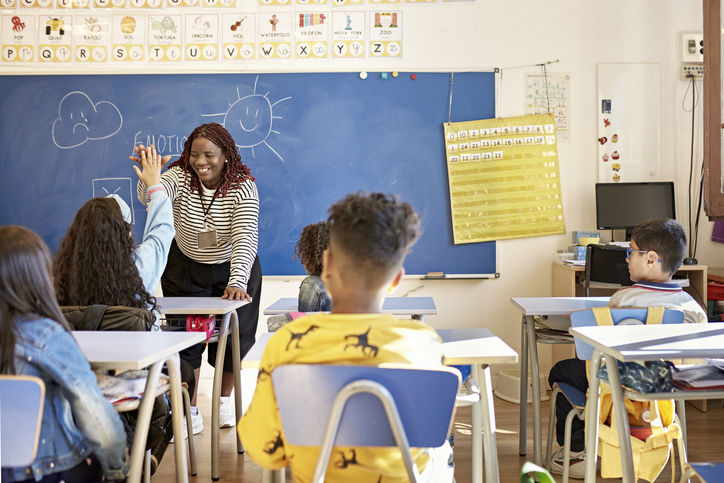Wednesday, January 4, 2023

What is Executive Function?
Every child must acquire fundamental life skills to successfully manage their schoolwork, extracurricular activities, and relationships. As they age, these skills carry them throughout life as they pursue higher education, join the workforce, and manage their adult relationships and physical and mental health.
These abilities are commonly referred to as executive functioning (EF) skills, or “a set of cognitive skills supported largely by the prefrontal cortex (PFC), [including] working memory (needed for managing and integrating information), inhibitory control (used to control thoughts, emotions, and behaviors), and cognitive flexibility (allowing the shift from one mind state or task to another)” (Wexler & Alexander, 2020). Children are not born with these cognitive processes, but they are born with the potential to develop them. Fortunately, school systems, educators, parents, and caregivers can facilitate environments that support the development of these core life skills.
Youth Executive Function and the Covid-19 Pandemic
Schools and parents were put to the test when the COVID-19 pandemic caused a worldwide lockdown in 2020. Children and adolescents had to transition to virtual schooling and began missing out on certain activities that are associated with the development of EF skills, like organized sports, peer socialization, and extracurricular activities. Without these activities readily available to them, educators and caregivers were forced to adapt to this new normal and get creative about ways to foster EF development outside of the classroom.
Despite how hard educators and parents worked to help children adjust to the new normal, it was stressful for children who did not yet possess the skills to fathom such a crisis. When children and adolescents are overwhelmed with ongoing stress, the development of their EF skills takes a back seat to make room for more primitive survival skills that allow the child to withstand challenging and confusing times (Harvard University, 2012). Researchers are concerned that children and adolescents who lived through the COVID-19 pandemic have experienced stress that will have an immediate and long-lasting impact on the development of some of their EF skills.
In a 2022 study on children’s growth in EF skills during the COVID-19 lockdown, researchers “confirmed concerns about the slower growth of executive functioning in children during the lockdown versus their peers before the pandemic, especially for cognitive flexibility and working memory” (Chichinina & Gavrilova, 2022). In a similar study, researchers also found issues with cognitive flexibility and working memory in the children in their sample, explaining that “longer video game times were associated with more behavioral issues in all executive functioning dimensions, while working memory issues increased with internet use (social networks, media streaming, web surfing) for fifth graders (Tabullo et al., 2022). Although these studies found difficulties with the development of cognitive flexibility and working memory during and after the pandemic, both studies suggest that children and adolescents’ inhibition and self-control skills remained largely unaffected by the lockdown.
What Parents and Educators Can Do
Thankfully, there is plenty that parents and educators can do to help get their children and students back on track during or after times of stress. For educators, evidence-based brain fitness interventions like mindfulness, cognitive training, social and emotional learning, and brain literacy can be used to target deficits in EF ability.
One recent study found a significant relationship between children’s engagement in self-care and family chores at home and their working memory and inhibition skills (Tepper et al, 2022). Having children participate in chores and family mealtimes is just one way to jumpstart the healthy development of their EF skills. Harvard University’s Center for the Developing Child’s report also gives specific age-based recommendations for activities that can enhance EF in their report, Enhancing and Practicing Executive Functions Skills with Children from infancy to Adolescence.
To learn more about specific, evidence-based efforts that parents and educators can make to help children and adolescents enhance and practice these core life skills, BrainFutures recommends visiting our Executive Function Report page where you can learn more about youth EF, brain fitness, and specific brain training programs that can be implemented at home and in schools.
References
Chichinina, E. A., & Gavrilova, M. N. (2022). Growth of Executive Functions in Preschool-Age Children During the COVID-19 Lockdown: Empirical Evidence. Psychology in Russia: State of the Art, 15(2). https://doi.org/10.11621/pir.2022.0209
Harvard University. (2012). (Issue brief). Executive Function. Cambridge, MA.
Tabullo, A. J., Canet-Juric, L., & Abusamra, V. (2022). Executive function difficulties among school-aged children during the COVID-19 pandemic: Associations with Home Literacy Environment, reading and Screen Media Times. https://doi.org/10.21203/rs.3.rs-1784639/v1
Tepper, D. L., Howell, T. J., & Bennett, P. C. (2022). Executive functions and household chores: Does engagement in chores predict children’s cognition? Australian Occupational Therapy Journal, 69(5), 585–598. https://doi.org/10.1111/1440-1630.12822
Wexler, B., & Alexander, K. (2020). Building Foundations for Well-Being by Strengthening Brain Fitness: Prevention and Early Intervention of Mental Health and Substance Abuse Problems. BrainFutures. Retrieved January 3, 2023, from https://www.brainfutures.org/wp-content/uploads/2020/06/EF-and-Mental-Health-Prevention-and-Early-Intervention.pdf